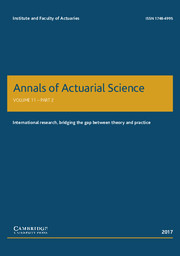This special issue of the Annals of Actuarial Science features a range of papers relating to the coronavirus pandemic. As the pandemic recedes, and many of us regard it now as having moved to the endemic phase, we find ourselves with the breathing space to stand back and consider how actuaries can contribute to a better understanding of the issues. I think it is worthwhile doing so from an international perspective, and my thoughts below are thus somewhat generic; I hope do not detract from the work done by the many Fellows of the Institute and Faculty of Actuaries who helped during the pandemic in whatever way they could.
Definitions of what an actuary is, and the related question of what constitutes the actuarial skillset, vary from country to country. Most actuaries would regard their professional skills as covering such aspects as:
The analysis of risk (in particular, mortality, morbidity, or equivalent non-life claims incidence), and associated risk management;
The mathematics of finance;
Developing models of future relating to contingent events (typically, cash flow models), and related aspects such as an appreciation of model risk, and a mature approach to model validation.
Actuaries are also necessarily conversant with the regulatory regimes affecting their own spheres of operation, as well as the broader financial, economic, and societal drivers relevant to their line of business.
Although this may appear a fruitlessly elementary listing, I think it is useful here as it demonstrates how so much of the pandemic falls into our field of expertise. The actuarial skillset clearly covers many of the areas that have occupied the news and our lives since early 2020: the parameterisation of risk, models of infectious spread and the related hospitalisation and mortality impacts, and estimation of the longer-term impacts of many of the measures introduced to control the pandemic. Related issues such as risk–reward trade-offs and cost–benefit analyses also fall into our domain of expertise.
Furthermore, actuaries generally work in situations where practical solutions are required: we advise on business decisions using the data and resources available in the time available. This point in particular, although hard to articulate in a way that would rank alongside the skills noted above, is an ideal mindset when faced with what we have been faced with over the last 2 years: strange and rapidly developing situations with sometimes scarce data.
Given these attributes, looking back I do find it somewhat disappointing to see how little actuaries in general, and the formal actuarial professions themselves worldwide, have informed or influenced in any meaningful way the management of the pandemic by Governments across the globe, or the public understanding of the underlying risks.
One may well argue that, given our niche role in fields such as insurance and pensions, it would be hard for actuaries to suddenly expect a seat at the pandemic decision-making table. To that extent, perhaps we have had more influence than many might have expected. However, in my field of work in the context of demographic risk, assumption setting, and the development of capital models in the UK and across EMEA, I have been surprised by the lack of interest and activity to date in considering how the pandemic might reasonably change our views of the future – whether best estimate or extreme scenarios.
If we adopt the classical perspective of mortality as comprising a current “base” assumption, and a future variation assumption (typically an assumption of improving mortality), there are a range of ways in which both the base and the future variation will likely change. For instance, base mortality will be affected by the forward displacement effect of COVID-19 deaths, an area which lends itself well to actuarial analysis. It will also be affected by endemic COVID-19, an interesting challenge as at this point such an adjustment would be largely subjective, and the “philosophy” of assumption setting has tacitly assumed that base mortality is an objective fact, with subjective elements left for the future variation assumptions.
A further challenge regarding base mortality is the extent to which any reliance can be placed on the experience of the 2020 and 2021 years (where the consensus view has been that no or little reliance should be placed on them). This problem is now resurfacing in respect of 2022, which in many countries seems abnormal (in a way only partially explained by COVID-19 deaths), and thus likely unpredictive of the future.
The large economic, health service, and societal impacts of the pandemic would in many countries be likely to change how mortality varies in the future. Those actuaries who use some form of driver-based or causal analysis to inform their future assumptions should be well placed to address this challenge; actuaries who rely wholly or primarily on a combination of historical extrapolation and peer benchmarking may perhaps realise that this approach really does not help to understand or predict plausible mortality trends.
Overall, there are many ways that actuaries involved in life insurance and pension fund work in particular can help within their “formal” areas of expertise. This edition contains a range of thought-provoking papers touching on such aspects.


